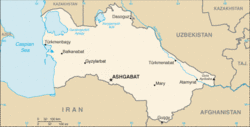Welcome to the Virtual Education Wiki ~ Open Education Wiki
Turkmenistan
by Paul Bacsich for Re.ViCa
For entities in Turkmenistan see Category:Turkmenistan
Partners situated in Turkmenistan
None.
Turkmenistan in a nutshell
(sourced from http://en.wikipedia.org/wiki/Turkmenistan)
Turkmenistan, in full the Republic of Turkmenistan (Turkmen: Türkmenistan Respublikasy), also known as Turkmenia (Russian: Туркмения) is a country in Central Asia. Until 1991, it was a constituent republic of the Soviet Union, the Turkmen Soviet Socialist Republic (Turkmen SSR).
It is bordered by Afghanistan to the southeast, Iran to the south and southwest, Uzbekistan to the east and northeast, Kazakhstan to the north and northwest and the Caspian Sea to the west.
Turkmenistan's GDP growth rate of 11.5% (IMF estimate for 2007) ranks 11th in the world, but official government statistics on which this estimate is based are widely regarded as unreliable. Although it is wealthy in natural resources in certain areas, most of the country is covered by the Karakum (Black Sand) Desert.
The population is 5.1 million. At 488,100 km2 (188,500 sq mi), Turkmenistan is the world's 52nd-largest country. It is slightly smaller than Spain and somewhat larger than the US state of California.
The capital is Ashgabat.

Turkmenistan is divided into five provinces or welayatlar (singular welayat) and one capital city district. The provinces are subdivided into districts (etraplar, sing. etrap), which may be either counties or cities. According to the Constitution of Turkmenistan (Article 16 in the 2008 Constitution, Article 47 in the 1992 Constitution), some cities may have the status of welaýat (province) or etrap (district).
The country possesses the world's fourth-largest reserves of natural gas and substantial oil resources. Half of the country's irrigated land is planted with cotton, making the country the world's tenth-largest producer of it.
Most of Turkmenistan's citizens are ethnic Turkmens with sizeable minorities of Uzbeks and Russians. Smaller minorities include Kazakhs, Tatars, Ukrainians, Armenians, Azeris, and Balochis. According to data announced in Ashgabat in February 2001, 91% of the population are Turkmen, 3% are Uzbeks and 2% are Russians. Between 1989 and 2001 the number of Turkmen in Turkmenistan doubled (from 2.5 to 4.9 million), while the number of Russians dropped by two-thirds (from 334,000 to slightly over 100,000).
Turkmen is the official language of Turkmenistan (per the 1992 Constitution), although Russian still is widely spoken in cities as a "language of inter-ethnic communication". Turkmen is spoken by 72% of the population, Russian 12%, Uzbek 9%, and other languages 7%. (Turkmen is the name of the national language of Turkmenistan. It is spoken by approximately 3,000,000 people in Turkmenistan, and by an additional approximately 380,000 in northwestern Afghanistan and 500,000 in northeastern Iran.)
Islam is the dominant religion in Turkmenistan (89% of the population); the 9% of the population that adheres to the Eastern Orthodox Church are ethnic Russians; the remaining 2% religion is reported as unknown. Islam came to the Turkmen primarily through the missionary activities of sheikhs. These sheikhs were holy men and they often were adopted as patriarchs of particular clans or tribal groups, thereby becoming their "founders." Reformulation of communal identity around such figures accounts for one of the highly localized developments of Islamic practice in Turkmenistan. Basic Islamic principles are taught in public schools. More religious institutions, including religious schools and mosques, have appeared, many with the support of Saudi Arabia, Kuwait, and Turkey. Religious classes are held in both schools and mosques, with instruction in Arabic language, the Qur'an and the hadith, and history of Islam.
Turkmenistan education policy
The entry at http://en.wikipedia.org/wiki/Education_in_Turkmenistan is out of date and very brief. Attempts continue to find a more up to date source of information in English.
Schools in Turkmenistan
Private schools
The Ashgabat International School is an international school in Ashgabat, Turkmenistan. It is a private, non-profit day school which offers an educational programme from a 3 to 4 year old program through high school for students of all nationalities. High school students may take courses by distance learning through the University of Nebraska High School Correspondence Program. School staff monitors all distance learning courses. The school was founded in 1994. For more details see http://en.wikipedia.org/wiki/Ashgabat_International_School
Higher education
EU sources (http://eacea.ec.europa.eu/extcoop/call/documents/turkmenistan.pdf) give the following list of 17 tertiary education institutions (universities in bold):
- Turkmen State University named after Magtymguly - http://www.tacistm.org/tempus/tgu.htm (in English)
- Turkmen Agricultural University named after S. Niyazov
- Turkmen Polytechnic Institute - see below
- Turkmen Institute of National Economy - see below
- Turkmen State Medical Institute
- Turkmen State Institute of Transport and Communication
- Turkmen National Institute of World Languages named after D.Azadi
- Turkmen National Institute of Sports and Tourism
- Turkmen State Institute of Energy
- Turkmen State Pedagogical Institute
- Turkmen-Turkish University. This was established in 1994. It comprises 3 faculties (The Faculty of Education, The Faculty of Economics, and The Faculty of Engineering), embracing 11 departments.
- Turkmen State Academy of Arts
- Turkmen State Institute of Culture
- Turkmen National Conservatoire
- Turkmen Police Academy
- Turkmen Military Institute
- Turkmen Military Academy
Universities in Turkmenistan
These include three universities:
- Turkmen State University named after Magtymguly - http://www.tacistm.org/tempus/tgu.htm (in English)
- Turkmen Agricultural University named after S. Niyazov
- Turkmen-Turkish University. This was established in 1994. It comprises 3 faculties (The Faculty of Education, The Faculty of Economics, and The Faculty of Engineering), embracing 11 departments.
Polytechnics in Turkmenistan
Leading ones include:
- Turkmen Polytechnic Institute. This is regarded as the leading institute in the country in engineering and energy.
- Turkmen Institute of National Economy. This is regarde as the leading institute in the country in economics
Higher education reform
The Bologna Process
Administration and finance
Quality assurance
Information society
Towards the information society
Information society strategy
Virtual inititiatives
Interesting Virtual Campus Initiatives
None known.
Interesting Programmes
Re.ViCa Case-study
None.
Lessons learnt
None so far.
References
- Country profile: Turkmenistan, Library of Congress, 2007, http://lcweb2.loc.gov/frd/cs/profiles/Turkmenistan.pdf
For OER policies and projects in Turkmenistan see Turkmenistan/OER